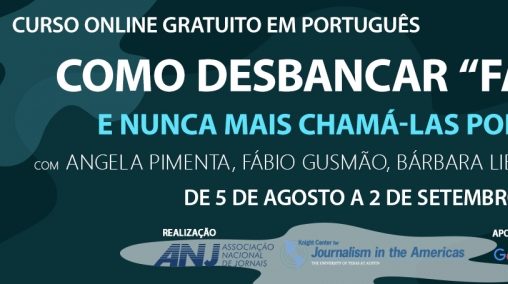
Journalists are bombarded with a huge amount of digital content that needs to be checked before it becomes news. To help with this task, the Knight Center for Journalism in the Americas and the National Association of Newspapers (ANJ) of Brazil, with the support of the Google News Initiative, launch the massive online course in Portuguese “How to debunk ‘fake news’ – and never call it by that name again.”
Participants will learn the steps for checking and verification to unmask fabricated news, deceptive memes, and manipulated videos that pop up on social networks. Registration is open and the MOOC begins August 5.
This four-week course will be coordinated by Ângela Pimenta, president of the Institute for the Development of Journalism (Projor) and coordinator of Projeto Credibilidade (Trust Project), an initiative aimed at creating indicators to distinguish quality journalism on the internet. Pimenta will also be one of the instructors.
Three additional experts will make up the team of instructors and present the concepts and practices to understand and deal with the fake news phenomenon: Pedro Burgos, founder of the project Impacto.Jor; Barbara Libório, journalist for Aos Fatos and Canal Meio; and Fábio Gusmão, online editor of Extra newspaper, in Rio de Janeiro.
“The upcoming elections promise to be polarized and marked by information clutter. This online training will give you the tools to separate misleading and legitimate news,” Ângela Pimenta said.
The course is based on the work of British researcher Claire Wardle, who runs Harvard University’s First Draft News research center and is one of the world’s leading authorities in the area. It will be divided into four modules:
As with all Knight Center courses, instructors will present their lessons in videos, and participants will also have access to weekly presentations, readings, discussion forums, and quizzes. The MOOC is asynchronous, meaning there are no live activities. Students can participate and complete activities throughout the week at their own pace, on the days and at the hours of their preference.
The course was designed for journalists, but is open to anyone interested in learning about the disinformation ecosystem and how to combat it. There are no prerequisites, participants will only need a stable internet connection to access the weekly modules.
“How disinformation can influence elections is a worldwide concern, and it is critical to provide tools for journalists to help unmask the rumors that are spreading across networks, especially at a time of polarization,” said Professor Rosental Alves, founder and director of the Knight Center at the University of Texas at Austin. “We are very happy to offer content so relevant to the coverage of politics in Brazil, and again with our partners from ANJ and the Google News Initiative.”
Students who successfully complete the course, including weekly questionnaires and participation in discussion forums, may obtain a certificate of completion of the course upon verification by the Knight Center staff. The certificate is optional and will be available in PDF format for US $30, upon confirmation of participation in the online course. However, no formal academic course credit of any kind is associated with the document. The payment of the fee can only be made using an internationally valid credit card, at the University of Texas at Austin’s secure website.
Sponsors
The National Association of Newspapers brings together the main newspapers in Brazil. ANJ was created in 1979 to defend freedom of expression, thought and propaganda, the unrestricted operation of the press, observing the principles of responsibility, and to fight for the defense of human rights, the values of representative democracy and free enterprise.
Google News Initiative (GNI) is Google’s initiative to foster the growth of journalism in the digital age. GNI marks a milestone in Google’s 15-year commitment to the news industry and reflects the company’s collaborative efforts to help the industry build a stronger future.
Thanks to donations from the Knight Foundation, the Knight Center for Journalism in the Americas was created in 2002 by Professor Rosental Alves, who holds the Knight Chair in International Journalism at the Journalism School of the University of Texas at Austin’s Moody College of Communication. The Knight Center distance education program began in 2003 and is funded in part by the Knight Foundation. Over the past five years, Knight Center MOOCs have reached more than 135,000 people in more than 170 countries.

Knight Center for Journalism in the Americas
300 West Dean Keeton
Room 3.212
Austin, TX, 78712
Phone: 512-471-1391
Email: journalismcourses@austin.utexas.edu